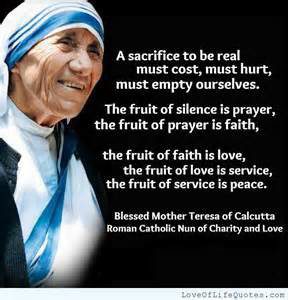 I asked my eight year old daughter what she thought sacrifice meant. She gave me a great answer: “It means giving up something for a reason or for a person– just like Jesus gave His life for us.” As I beamed with pride, I realized that though she might know the definition, did she really understand what it means to sacrifice as human being in today’s world?
I asked my eight year old daughter what she thought sacrifice meant. She gave me a great answer: “It means giving up something for a reason or for a person– just like Jesus gave His life for us.” As I beamed with pride, I realized that though she might know the definition, did she really understand what it means to sacrifice as human being in today’s world?
One of the greatest problems in today’s society isn’t necessarily selfishness, rather it is the inability to sacrifice, though the two absolutely go hand in hand. Wanting something for oneself isn’t necessarily bad, but not being able to give up that which we already have, or that which we feel entitled to, for a greater purpose is a much more pervasive problem. We generally admire the virtue of sacrifice, and most people do indeed regard it as a virtuous attribute. We feel it is a good thing but recognize that it is so very hard to accomplish and many do not possess the integrity or perhaps the strength to do it. For instance, we are too weak to give up junk food in order to be healthy; weight issues are rampant in our country. We have difficulty sacrificing spontaneous purchases so we may never save for something better. We do not want to give up our time to serve others, much less our very lives if it actually came right down to it. We admire those who sacrifice, for they are most definitely strong, selfless, and loving. It is something to which we as Catholic Christians aspire.
For something to be truly a sacrifice, it must have purpose. This is where our Faith comes into play. It is all well and good to sacrifice in order to maintain a healthy weight or to sacrifice indulgent purchases, but the important sacrifices are those that bring us closer to Christ and His Cross; the other stuff is just practice. True sacrifice comes from a motivation deep within—inspired by something greater than ourselves. The Holy Spirit is the voice that utters the right things to do and the words of encouragement to do whatever it is in considered to be a worthy sacrifice.
I do believe God wants us to pray about absolutely everything. I pray while dieting or exercising or trying to stay frugal; these prayers for strength are practice. They enable me to work on becoming stronger and better for the times when it will really count. In other words, little sacrifices are important in preparing us for selfless living.
I have come to realize that there are things that I sacrifice in my life as a wife and mother. At times, those are sacrifices that are inherent of the position, so in accepting my vocation as such, I find them to be part of the job – easy yet hard. I feed and clothe my children, always putting their needs before my own. I am faithful to my husband; I do not have emotional nor physical relationships more intimate than our marriage. Those sacrifices are easy for me, though they might be difficult for others. I have certainly been tested in those areas, and that is when I am reminded that they are truly sacrifices.
I started to then think of how I am to teach my children to sacrifice in the most selfless sense of the term. We all know examples are the best teaching methods, however, we also know that we are not to be showy when we give something up. Sacrifice is most effective when performed with a joyful selfless heart. “Rend your hearts, not your garments” (Joel 2:13) So how are our children supposed to understand our examples if we are sacrificing joyfully and not showing the difficulty that is requisite of suffering? Our examples must not show dread towards our sacrifice and suffering, however, when it comes to our children, I feel it is important to communicate how hard it is for us to give something up. It makes the idea of sacrifice less daunting and absolutely attainable. It is good for them to understand that we give up things in our lives– for God, for others and for them, not to make them feel guilty, but to show them that sacrifice is hard, and when it is done out of love, it is possible, because their ordinary mom or dad does it daily. I want them to know that I sacrifice for them because I love them more than I love myself; that is why I do it and that is why Christ did it, and this is how we are to love others—above ourselves, just as Jesus loves. I tell them I am happy to give up myself for them; hopefully, this teaches them not only sacrifice but gratitude as well.
 This is possible even with our adult children. My parents were amazing examples of self-sacrifice. I most recently watched my own mother give up ten years of her life to care for my elderly grandparents before they died, the last six were of which my grandmother was bedridden and non-communicative and her care required diaper changing, feeding tube, scheduling of nurses, medications, bathing, and dressing. My mother suffered emotionally and physically through this sacrifice, but never did I doubt it was all done out of love and undoubtedly brought her closer to Christ. I realize now, as an adult, how much my parents gave up for my sister and me as well—bypassing the nice home, furnishings, vacations, and vehicles in favor of paying Catholic school tuition. It was always obvious they did this out of love for us. Even now, they go out of their way daily to help with their grandchildren. What incredible examples I have been fortunate to have in my own life.
This is possible even with our adult children. My parents were amazing examples of self-sacrifice. I most recently watched my own mother give up ten years of her life to care for my elderly grandparents before they died, the last six were of which my grandmother was bedridden and non-communicative and her care required diaper changing, feeding tube, scheduling of nurses, medications, bathing, and dressing. My mother suffered emotionally and physically through this sacrifice, but never did I doubt it was all done out of love and undoubtedly brought her closer to Christ. I realize now, as an adult, how much my parents gave up for my sister and me as well—bypassing the nice home, furnishings, vacations, and vehicles in favor of paying Catholic school tuition. It was always obvious they did this out of love for us. Even now, they go out of their way daily to help with their grandchildren. What incredible examples I have been fortunate to have in my own life.
This idea of sacrifice permeates every aspect of our lives. We refrain from hedonistic and self-indulgent desires, and instead strive to understand how living selflessly will bring us closer to God and His Promise of everlasting life. It is good to teach our children this view of sacrifice: it is difficult and not so very fun, but we are better for it and closer to Salvation because of our ability to love Christ more than we want earthly pleasures and ease in our lives.
What ways have you been able to show sacrifice in a big way to those you love?
